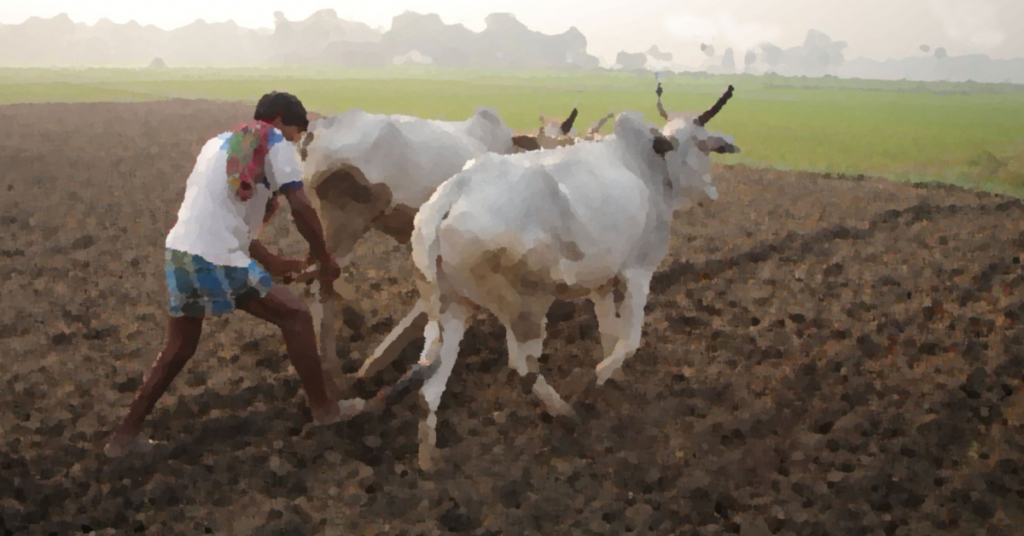
Big Win for Farmers’ Rights as Key Bills make it to Parliament Bills pertaining to Indebtedness and Minimum Support Price will be introduced as Private Members Bills
30, Apr 2018 | Mansi Mehta
In a significant victory for rights of India’s agrarian community, two major bills geared towards the welfare of farmers, have received the backing of 21 political parties. These are ‘Farmers Freedom from Indebtedness Bill 2018’ and ‘Farmers’ Right to Guaranteed Remunerative Minimum Support Price for Agricultural Commodities Bill 2018′.
On Wednesday, April 25, the All India Kisan Sangharsh Coordination Committee (AIKSCC), an umbrella group of farmers’ organisations, met with representatives of some National Democratic Alliance (NDA) parties, and some Opposition parties to discuss and finalise the two bills. Present at the meeting were Sharad Pawar of the NCP, Sharad Yadav and Deependra Hooda of the Congress party, as well as representatives of the RJD, Shiv Sena, AAP, BJD, and CPM, among others. Additionally, other parties, including the TDP, Samajwadi Party, BSP and others had offered support via writing. The two bills will now be presented in Parliament as private members’ bills.
Citizens for Justice and Peace (CJP) has long supported farmers’ rights and the struggle of India’s agrarian communities, and these bills are a significant step in the right direction. Support CJP’s work for farmers and Adivasis. Donate Now.
Farmers Unite to move Forward Together
In June 2017, 6 farmers were shot dead by the police during a farmers’ agitation in Madhya Pradesh. In wake of this the All India Kisan Sangharsh Coordination Committee (AIKSCC) was formed, to deal with the two crucial issues of loan waiver and remunerative prices. Today AIKSCC is an umbrella group of over 190 farmers’ organisations, and the All India Kisan Sabha (AIKS) is an important constituent. In November 2017, a two-day Kisan Sansad and a Mahila Kisan Sansad were organised in New Delhi in which tens of thousands of farmers from all over the country participated. Two bills on loan waiver and remunerative prices were placed in the Kisan Sansad with the purpose of eventually placing them before Parliament.
“The two Kisan Mukti bills are introduced as Private Members’ Bill by Raju Shetti, Swabhimana Paksha MP from Maharashtra and K K Ragesh, Rajya Sabha MP from CPI(M) in the parliament. Farmers from across the country have decided to send letters to the speakers of Lok Sabha and Rajya Sabha, stating how the Kisan Mukti Bills are important for them,” VM Singh, Convener of AIKSCC told Newsclick.
The Kisan Long March
More than 50 years after the late Prime Minister Lal Bahadur Shastri declared ‘Jai Jawan, Jai Kisan‘, India’s farmers continue to suffer, with their plight being neglected by those who could work to alleviate their problems. In March 2018, more than 30,000 farmers and Adivasis from Maharashtra began the Kisan Long March from Nashik, walking all the way to Mumbai over a 6 day period to peacefully protest and ensure the government heard their demands, which included an unconditional loan waiver programme, ending the forceful acquisition of farmland for infrastructure projects like bullet trains, and compensation for those whose crop was affected by hailstorms and pests.
The farmers marched in solidarity with their Adivasi brethren, who had sought the rights to land they had been tilling, and the full implementation of the Forest Rights Act. The Maharashtra government eventually acquiesced to all their demands, in writing. Farmers in Odisha also mounted a satyagraha in March to make their demands, including a monthly pension, heard.
The struggles of India’s farmers
Even as they comprise the backbone of India’s economy, farmers have long struggled to make a living against major headwinds. Many struggle with the widespread indebtedness that has plagued the agricultural community, having become embroiled in loans that they cannot hope to repay, with government loan waiver schemes offering little relief. This has led to an en epidemic of farmer suicides. In May 2017, the central government told the Supreme Court that more than 12,000 suicides were reported in the agricultural sector since 2013.
Farmers, who put in backbreaking work daily, have also suffered other health concerns. In the latter part of 2017, eastern Maharashtra saw 18 pesticide-related farmer deaths, with another 800 people being admitted to hospitals in several districts. It was later found that those who died from poisoning after they were exposed to excessively toxic pesticides that should never have been sold in the local market, indicating that the regulating authorities were either incompetent or complicit in the availability of these unlicensed pesticides, many containing extremely toxic substances.
Farmers have also been agitating for a fair minimum support price (MSP) for their crop, one that would allow them to make ends meet and live with dignity. They have also fallen victim to forcible land acquisitions. Recently, more than 5,000 farmers in Gujarat and their families penned letters to authorities seeking permission to die over fears that they land they are cultivating would be forcibly taken away by a state power utility.
With the effects of climate change already making themselves known, 2018’s Economic Survey found that events rising from the phenomenon could result in a significant reduction in farmers’ incomes. The survey projected that incomes could decline by 12% on average in the coming years if farmers are unable to adapt, or if policy changes, such as those relating to irrigation, are not made. When considering all factors, farmers’ income could drop by 15% to 18%, or even up to 20%-25% in unirrigated areas. India’s irrigation infrastructure for agriculture remains inadequate, with farmers struggling with water scarcity after successive droughts in states like Maharashtra, coupled with the rampant theft of water.
Related:
When Farmers burn the Midnight Oil










